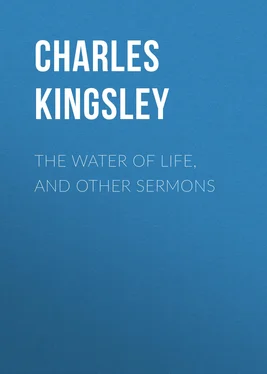Charles Kingsley - The Water of Life, and Other Sermons
Здесь есть возможность читать онлайн «Charles Kingsley - The Water of Life, and Other Sermons» — ознакомительный отрывок электронной книги совершенно бесплатно, а после прочтения отрывка купить полную версию. В некоторых случаях можно слушать аудио, скачать через торрент в формате fb2 и присутствует краткое содержание. Жанр: foreign_prose, foreign_religion, Философия, foreign_psychology, foreign_antique, на английском языке. Описание произведения, (предисловие) а так же отзывы посетителей доступны на портале библиотеки ЛибКат.
- Название:The Water of Life, and Other Sermons
- Автор:
- Жанр:
- Год:неизвестен
- ISBN:нет данных
- Рейтинг книги:4 / 5. Голосов: 1
-
Избранное:Добавить в избранное
- Отзывы:
-
Ваша оценка:
- 80
- 1
- 2
- 3
- 4
- 5
The Water of Life, and Other Sermons: краткое содержание, описание и аннотация
Предлагаем к чтению аннотацию, описание, краткое содержание или предисловие (зависит от того, что написал сам автор книги «The Water of Life, and Other Sermons»). Если вы не нашли необходимую информацию о книге — напишите в комментариях, мы постараемся отыскать её.
The Water of Life, and Other Sermons — читать онлайн ознакомительный отрывок
Ниже представлен текст книги, разбитый по страницам. Система сохранения места последней прочитанной страницы, позволяет с удобством читать онлайн бесплатно книгу «The Water of Life, and Other Sermons», без необходимости каждый раз заново искать на чём Вы остановились. Поставьте закладку, и сможете в любой момент перейти на страницу, на которой закончили чтение.
Интервал:
Закладка:
Charles Kingsley
The Water of Life, and Other Sermons
SERMON I
THE WATER OF LIFE
And the Spirit and the Bride say, Come. And let him that heareth say, Come. And let him that is athirst come. And whosoever will, let him take the water of life freely.
This text is its own witness. It needs no man to testify to its origin. Its own words show it to be inspired and divine.
But not from its mere poetic beauty, great as that is: greater than we, in this wet and cold climate, can see at the first glance. We must go to the far East and the far South to understand the images which were called up in the mind of an old Jew at the very name of wells and water-springs; and why the Scriptures speak of them as special gifts of God, life-giving and divine. We must have seen the treeless waste, the blazing sun, the sickening glare, the choking dust, the parched rocks, the distant mountains quivering as in the vapour of a furnace; we must have felt the lassitude of heat, the torment of thirst, ere we can welcome, as did those old Easterns, the well dug long ago by pious hands, whither the maidens come with their jars at eventide, when the stone is rolled away, to water the thirsty flocks; or the living fountain, under the shadow of a great rock in a weary land, with its grove of trees, where all the birds for many a mile flock in, and shake the copses with their song; its lawn of green, on which the long-dazzled eye rests with refreshment and delight; its brook, wandering away—perhaps to be lost soon in burning sand, but giving, as far as it flows, Life; a Water of Life to plant, to animal, and to man.
All these images, which we have to call up in our minds one by one, presented themselves to the mind of an Eastern, whether Jew or heathen, at once, as a well-known and daily scene; and made him feel, at the very mention of a water-spring, that the speaker was telling him of the good and beautiful gift of a beneficent Being.
And yet—so do extremes meet—like thoughts, though not like images, may be called up in our minds, here in the heart of London, in murky alleys and foul courts, where there is too often, as in the poet’s rotting sea—
‘Water, water, everywhere,
Yet not a drop to drink.’
And we may bless God—as the Easterns bless Him for the ancestors who digged their wells—for every pious soul who now erects a drinking-fountain; for he fulfils the letter as well as the spirit of Scripture, by offering to the bodies as well as the souls of men the Water of Life freely.
But the text speaks not of earthly water. No doubt the words ‘Water of Life’ have a spiritual and mystic meaning. Yet that alone does not prove the inspiration of the text. They had a spiritual and mystic meaning already among the heathens of the East—Greeks and barbarians alike.
The East—and indeed the West likewise—was haunted by dreams of a Water of Life, a Fount of Perpetual Youth, a Cup of Immortality: dreams at which only the shallow and the ignorant will smile; for what are they but tokens of man’s right to Immortality,—of his instinct that he is not as the beasts,—that there is somewhat in him which ought not to die, which need not die, and yet which may die, and which perhaps deserves to die? How could it be kept alive? how strengthened and refreshed into perpetual youth?
And water—with its life-giving and refreshing powers, often with medicinal properties seemingly miraculous—what better symbol could be found for that which would keep off death? Perhaps there was some reality which answered the symbol, some actual Cup of Immortality, some actual Fount of Youth. But who could attain to them? Surely the gods hid their own special treasure from the grasp of man. Surely that Water of Life was to be sought for far away, amid trackless mountain-peaks, guarded by dragons and demons. That Fount of Youth must be hidden in the rich glades of some tropic forest. That Cup of Immortality must be earned by years, by ages, of superhuman penance and self torture. Certain of the old Jews, it is true, had had deeper and truer thoughts. Here and there a psalmist had said, ‘With God is the well of Life;’ or a prophet had cried, ‘Ho, every one that thirsteth, come ye to the waters, and buy without money and without price!’ But the Jews had utterly forgotten (if the mass of them ever understood) the meaning of the old revelations; and, above all, the Pharisees, the most religious among them. To their minds, it was only by a proud asceticism,—by being not as other men were; only by doing some good thing—by performing some extraordinary religious feat,—that man could earn eternal life. And bitter and deadly was their selfish wrath when they heard that the Water of Life was within all men’s reach, then and for ever; that The Eternal Life was in that Christ who spoke to them; that He gave it freely to whomsoever He would;—bitter their wrath when they heard His disciples declare that God had given to men Eternal Life; that the Spirit and the Bride said. Come.
They had, indeed, a graceful ceremony, handed down to them from better times, as a sign that those words of the old psalmists and prophets had once meant something. At the Feast of Tabernacles—the harvest feast—at which God was especially to be thanked as the giver of fertility and Life, their priests drew water with great pomp from the pool of Siloam; connecting it with the words of the prophet: ‘With joy shall ye draw water out of the wells of salvation.’ But the ceremony had lost its meaning. It had become mechanical and empty. They had forgotten that God was a giver. They would have confessed, of course, that He was the Lord of Life: but they expected Him to prove that, not by giving Life, but by taking it away: not by saving the many, but by destroying all except a favoured few. But bitter and deadly was their wrath when they were told that their ceremony had still a living meaning, and a meaning not only for them, but for all men; for that mob of common people whom they looked on as accursed, because they knew not the law. Bitter and deadly was their selfish wrath, when they heard One who ate and drank with publicans and sinners stand up in the very midst of that grand ceremony, and cry; ‘If any man thirst, let him come to Me and drink. He that believeth on Me, as the scripture hath said, Out of him shall flow rivers of living water.’ A God who said to all ‘Come,’ was not the God they desired to rule over them. And thus the very words which prove the text to be divine and inspired, were marked out as such by those bigots of the old world, who in them saw and hated both Christ and His Father.
The Spirit and the Bride say, Come. Come, and drink freely.
Those words prove the text, and other texts like it in Holy Scripture, to be an utterly new Gospel and good news; an utterly new revelation and unveiling of God, and of the relations of God to man.
For the old legends and dreams, in whatsoever they differed, agreed at least in this, that the Water of Life was far away; infinitely difficult to reach; the prize only of some extraordinary favourite of fortune, or of some being of superhuman energy and endurance. The gods grudged life to mortals, as they grudged them joy and all good things. That God should say Come; that the Water of Life could be a gift, a grace, a boon of free generosity and perfect condescension, never entered into their minds. That the gods should keep their immortality to themselves seemed reasonable enough. That they should bestow it on a few heroes; and, far away above the stars, give them to eat of their ambrosia, and drink of their nectar, and so live for ever; that seemed reasonable enough likewise.
Читать дальшеИнтервал:
Закладка:
Похожие книги на «The Water of Life, and Other Sermons»
Представляем Вашему вниманию похожие книги на «The Water of Life, and Other Sermons» списком для выбора. Мы отобрали схожую по названию и смыслу литературу в надежде предоставить читателям больше вариантов отыскать новые, интересные, ещё непрочитанные произведения.
Обсуждение, отзывы о книге «The Water of Life, and Other Sermons» и просто собственные мнения читателей. Оставьте ваши комментарии, напишите, что Вы думаете о произведении, его смысле или главных героях. Укажите что конкретно понравилось, а что нет, и почему Вы так считаете.












